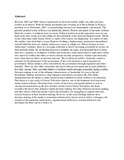| dc.description.abstract | Between 2007 and 2008, Kenya experienced an electoral conflict unlike any other previous conflict in its history. With the abrupt declaration and swearing in of Mwai Kibaki as Kenya's president on zs' December, 2007, a corresponding reaction was immediately experienced. The peaceful political scene in Kenya was drastically altered. Protests and spates of sporadic violence filled the country. A political crisis was born. Political leaders from the opposition were on one hand up in arms crying foul and calling for the annulment of the final presidential results. Media on the other hand made frantic efforts to report what exactly was happening. In a matter of time, the conflict went from bad to worse. Reports of killings, displacement, destruction and political turmoil filled the airwaves.
Indeed, democracy comes at a high cost.
This is because in most 'democratic' countries, there is a worrying trend that is slowly becoming acceptable in society. In most societies today, for an election process to complete its cause, several people have to loose their lives, property or livelihood. Conflict and democracy seem intertwined to each other; where one cannot do without the other yet from a human security perspective, violence and insecurity more often than not affect an election outcome. This is electoral conflict. Generally, media is operated by the permission of the government. It has to be licensed to run its business by government. Hence media is often controlled by the government through regulation and other channels. There are also other constraints and factors that govern media and at times influence how they operate. They can either hinder or facilitate media messages especially during conflict. Decision-making is one of the defining characteristics of leadership. It's core to the job description. Making decisions is what managers and leaders are paid to do. The media management has the ability to make decisions that contribute towards conflict or its reduction.
This thesis is a case study of Citizen Television which is one of the dominant local renowned media station in Kenya. Drawing from a series of interviews and questionnaires as well as viewing documentation on the post election violence from Citizen Television, the thesis examines the factors that influence media decision-making, how they influence decision-making and their effects. Often the media owners and journalists are struggling to suppress bias and exercise honesty in their decision-making. However, as the study findings indicate news decision-making of the media is sometimes influenced by factors such as fellow colleagues, the routines of the particular media house, organizational influences, external influences and ideologies but there can be a limit to it. | en_US |

